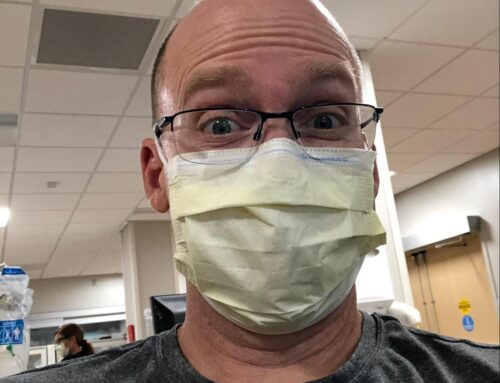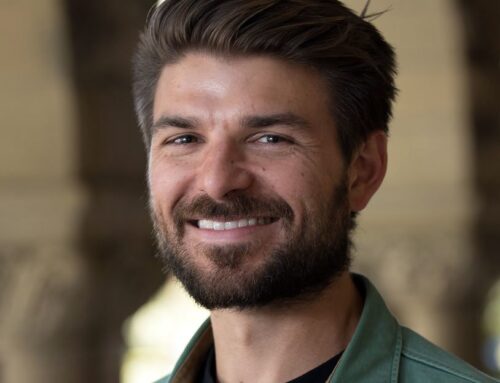Dr. Brian Lin is an emergency physician who truly knows how to keep well! Despite multiple work commitments, he still finds time to engage in his interests, keep fit, and stay well. From completing half-marathons to training capoeira, Dr. Lin, constantly finds ways to keep things fresh. He even shares his tips on how to integrate wellness into your day. Here’s how he stays healthy in EM!
- Name: Brian Lin

- Location: San Francisco
- Current job(s): Attending Emergency Physician, Kaiser Permanente
- One word that describes how you stay healthy: Balance
- Primary behavior/activity for destressing: Running
What are the top 3 ways you keep healthy?
I am pretty physically active. I think this is the primary way I keep stress levels down and focus up. In terms of physical wellness:
- What I make time for: I train capoeira, a Brasilian martial art involving elements of dance and percussion. I enjoy this as a physical activity because it requires so much presence of mind that it doesn’t really feel like a workout while I am doing it, and allows me to temporarily forget about everything else on my mind. Further, as I often joke: you might think running a code in the emergency department is anxiety provoking, you might think having a full panel of patients and nurses pulling you in all directions is stressful, but you don’t know true fear until you’ve been surrounded by people clapping while a 6 foot tall, 250 lb, 20 year old Brasilian dude is trying to kick you in the face.While I love capoeira, it is often hard to get to classes given my busy work schedule, so alternately…
- When I don’t have enough time: I run. Either on a treadmill with a movie playing, or better yet outdoors by the bay front in San Francisco. Pounding the pavement has always been a great release for me. I am not competitive by any means but I like to set up challenges for myself throughout the year to keep myself motivated. I’ve completed 7-8 half marathons (highly recommended) and one full marathon (wouldn’t recommend it) and countless shorter fun runs. Having a race to prepare for helps motivate me to get a run in when I otherwise would be trying to find an excuse not to.Some days are so busy I can’t even find the time to get a run in, in this case…
- When I don’t have any time: I bike. specifically, I ride my bike to work. It’s 5 miles each way, and I can justify the time spent because it is getting me somewhere I need to go anyways. It’s better than a cup of coffee in terms of the catecholamines I need to get my shift rolling, and it’s a refreshing way to decompress from a long shift in the ER to have the wind rushing over my face as I roll down San Francisco’s urban streets, reflecting on the patient encounters for the day.
What’s your ideal workout?
A capoeira class followed by a great roda (circle, where two competitors “play” capoeira, meaning compete). This is an ideal workout because it doesn’t really feel like work. Just a rush of energy, while you’re surrounded by friends.
Do you track your fitness? How?
Yes, through the Apple watch fitness tracker, and counting miles run/cycled via the Strava fitness app.
How do you prepare for a night shift? How do you recover from one?
I am not good at afternoon napping, so I try to sleep in the morning before the shift until 11 am or noon (when possible). I avoid caffeine until late in the evening so I can get the maximum effect. Other than that, it is business as usual during the day until the night shift starts. Now that I have two small children, my days are rarely my own: my wife and I have to contend with every day issues like getting the kids to/from preschool, having food ready for dinner, and the bedtime routine. This has made preparation much more challenging.
How do you avoid getting “hangry” (angry due to hunger) on shift?
I confess that I am a pretty unhealthy snacker during my night shifts. That is to say, my usual guidelines for healthy eating are a little compromised and I will typically eat whatever the nurses or other staff bring to share, and that’s rarely healthy food.
I occasionally try to pack healthier snacks, but they never look as good at 3 am. Especially compared to the chocolate candies that the nurses bring!
I am open to any good suggestions others have!
How do you ensure you are mentally in check?
My wife usually takes care of this for me. Reserving time to decompress, discuss the future, and appreciate the present with her helps prevent me from frying any circuitry up top, or at least, not too much of it. I do the same for her on her tough clinic days (she is a primary care NP). When we are both fried, we like to take the kids and get out of the city for a short hike in nature, either in the woods or by the beach. This change of scenery seems to help us both when we are in need of a head check.
What are the biggest challenges you face in maintaining a longstanding career in EM? How do you address these challenges?
Burnout from monotony. Sounds strange because when I entered EM, part of my reasoning is that I felt it could never become boring to me. The reality is that the humdrum of (seemingly) repetitive complaints and cases from shift to shift, over years and years of an EM career does have the potential to start to feel automatic, unchallenging, and even grating.
How I combat this:
Firstly, my involvement in academic medicine through teaching-on shift with residents and medical students, in lecture settings as a presenter, and even online these days through www.lacerationrepair.com – is one way I’ve kept it fresh. Being involved in teaching means you will always maintain the ability to see boilerplate EM through the eyes of a beginner.
Secondly, I try to make sure that for EVERY patient I see in the ED, I try to create one “micro challenge” for myself. Whether it is doing something slightly differently (eg I usually intubate with a mac blade–maybe I should try a Miller in this situation?) or reinforcing/expanding my fund of knowledge (This patient has a history of CLL–how much do I really understand about this disease? better read a little bit about it); or even expanding my history to include not necessarily medically relevant details (This patient is 90 years old and has lived through a lot–I should ask her what it was like to be young during the Great Depression.). The rules of “micro challenges” is that they have to be completed in real time, on shift, while I am caring for the patient; and they never take more than 5 minutes (longer than that doesn’t work for the ED pace). This not only helps me to become a better doctor, but helps me stay interested and passionate about what I am doing.
Best advice you have received for maintaining health?
TURN OFF all screens 1 hour before bed time. It’s becoming more and more important advice every year as we are becoming more and more reliant on desktops, laptops, tablets, smartphones, wearables, etc. Screens off ensures a better night’s sleep. Trust me, if you check that email one last time before turning off the lights, you will always find 5 more tasks to complete.
Who would you love for us to track down to answer these questions?
Graham Walker




